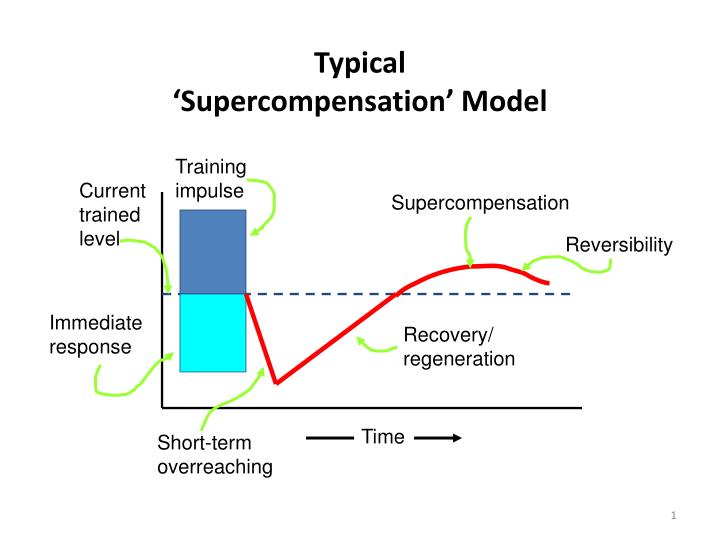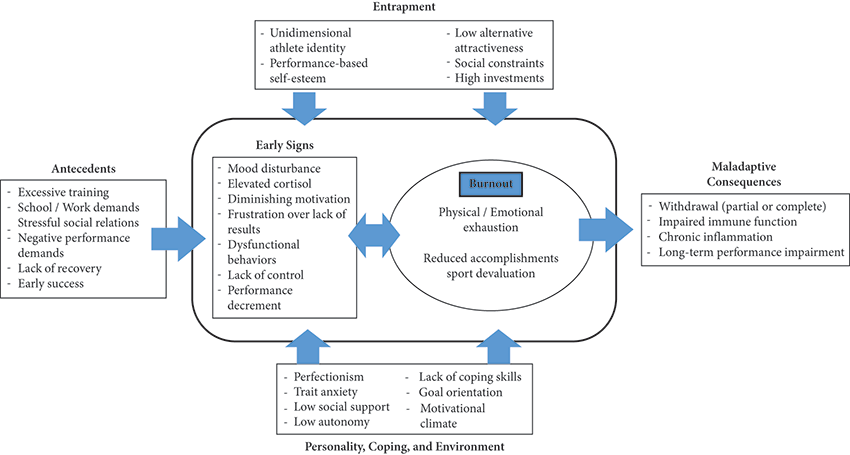A Prime Factor to Reduce Injury and Burnout while Improving Performance: Recovery!
Injured often? Tired? Always fatigued? Are you lacking the passion for a Sport that you have always had? There is a strong chance you are overtraining and burned out. In this post, we will define overtraining and burnout while giving potential solutions to overcome & avoid it.
As an athlete at any level, it is hammered home you have to work hard to be successful. There is no argument there. However, hard work does not mean just destroying your body everyday. A better phrase would be to work hard AND work smart. In other words, you need to recover as hard as you work. The reason? That is where your body actually makes changes!
Supercompensation is the goal – that is, the body adapts to a stimulus and comes back better. Whether your goal is to get stronger, more powerful, or better conditioned, its is absolutely critical that the body is allowed to recover so the body comes back stronger (see below).

When a training session is finished, you are not as strong/fast/or powerful as you were at the beginning. This is similar to after any match or race. You are stronger and better conditioned beforehand. Afterward, your body has expended its resources and no longer feels as fresh, and chances are, there may be some type of fatigue. At this stage, eating and sleeping are primary catalysts for recovery, thus allowing the body to come back stronger and ready for more the next time.
However, if you are sleeping poorly & eating poorly, your body may not have the ability it needs to replenish its resources. Your body needs proper amounts of macronutrients (protein, carbs, fats) and micronutrients (vitamins & minerals). In addition, your body needs sleep in order to promote a healthy memory, reduce illness by regulating your immune system, and improve emotional control through hormone regulation. Simply put, eating and sleeping allow the body to rebuild & perform better. Without proper recovery, you can be led down the path of overtraining (see below).

During overtraining, energy lacks, injuries start to occur, passion for the sport wanes, and over time this can lead to a general lack of motivation and discipline for the sport. Going even further, an athlete can start to burn out (see below).

With burnout, there is complete physical and emotional exhaustion to the point where an athlete likely wants to just “give up,” and the sport no longer is valued. This happens with consistent overtraining, which leads to a lack of performance (getting beat regularly, not accomplishing personal goals) and minor/major injuries. The graphic above shows the total effect of burnout from a biopsychosocial perspective.
Now does this mean that you should not work hard? Absolutely not!!! Again, hard work is a prerequisite to having a CHANCE to succeed. But it needs to be balanced with the “smart” work – that is regulated load, volume, & intensity balanced with nutrition, sleep, and appropriate work/life balance.
The body is an AMAZING thing – but you need to take care of it and progress it properly. Too little means no development, too much means a breakdown. Your goal is to balance the work and recovery.
Action steps:
DETERMINE BASELINE (Know Where You Are)
- Audit your Nutrition, Activity, & Energy
- Track your meals using an app such as My Fitness Pal for 1 week.
- Track your energy, mood, and clarity levels in the morning/noon/night
- Track your hours of sleep and quality for 1 week. You can also use a watch such as Whoop or Polar. I personally like ALL electronics off when I sleep, however.
- Use a metabolic equation to determine your approximate calories burned per day (e.g. The Cunningham Equation) on high/mid/low-intensity training & non-training days. I recommend multiple equations to understand the range of possibilities.
- Compare your Calorie Intake (My Fitness Pal) to Calorie Expenditure (Cunningham equation) to determine Energy Balance.
TAKE ACTION (Set Goals and Execute)
-
- Create a meal plan using My Fitness Pal to balance Calorie Intake & Calorie Expenditure. +500kcal for muscle gain, -500kcal for weight loss.
- As an athlete, be sure to take in 2g/kg BW protein evenly spread throughout 4-6 meals during the day. Have the last meal be a double protein meal.
- Follow the plan!
- Make a calendar to balance sleep, work or school, training, and personal time obligations.
- Within the calendar, schedule in: meals & snacks, time to turn off electronics, time for sleeping (minimum 8 hours for adolescents), time for waking up.
- Track your energy, mood, and clarity levels at morning/noon/night.
- Create a meal plan using My Fitness Pal to balance Calorie Intake & Calorie Expenditure. +500kcal for muscle gain, -500kcal for weight loss.
Depending upon the level of overtraining or burnout, it can take 2 weeks and up to 6 months to fully recover.
I hope this helps! Feel free to contact me with questions!

